#the turtle from nomads
Explore tagged Tumblr posts
Text
Heyoo!
I've been hooked on nomads recently so of course I just HAD to draw something
I know the series is pretty angsty right now, so here ya go!

the quartet (I don't know what comes after trio💀) riding on one of the turtles in the sea kingdom
I was admitedly very lazy with the outfit design and honestly I'm not even gonna try and hide the fact that that turtle was 100% traced💀
I wasn't in the mood to do ANOTHER study, which uh... probably explains a lot
Oh wow, I wonder how long that took me to-

oh well😭😭😭😭
hope @captain-juuter (the author) likes it at least💀
#nomads webtoon#nomads#lance nomads#satra nomads#poko nomads#saber nomads#the turtle from nomads#I'm legit kinda upset about the fact that I spent almost thirty hours on this and THAT'S THE QUALITY????#y'all I am regresseing😭#it's downhill from here on out#I am actually so sorry for like everything in that image#The shading is so uneven but I have lost all and any motivation to keep working on it#also the lineart is so💀#aight Imma stop complaining before y'all start thinking I'm fishing for compliments#I really just need to find a way to improve so I'm listing down things I don't like about it#so I can watch out for it in the next thing I draw#if you've actually read all this omg bless your heart#but why waste time like that💀#loser(affectionate)#go do something productive
88 notes
·
View notes
Text
I can't stand the dues ex lion-turtle thing but Aang really did manifest a vegan option for taking out ozai and that's very girlboss of him
#atla#aang#atla aang#i just think the lion turtle was a cop out#and i have issues with the idea that taking Ozai's bending removes him from being a threat#especially since sokka has a whole episode about realizing that he has worth and is vital to the gaang deapite not being a bender#but yeah i get why not having aang kill ozai also is a nice thing thematically#with the whole not having to sacrifice the air nomad's ways as the last airbender thing#but like also aang is the avatar and can't be a true air nomad#i just think the whole killing or not killing thing should have come up earlier and been dealt with or debated the entire 3rd season
7 notes
·
View notes
Text
Genocide experts warn that India is about to genocide the Shompen people
Who are the Shompen?
The Shompen are an indigenous culture that lives in the Great Nicobar Island, which is nowadays owned by India. The Shompen and their ancestors are believed to have been living in this island for around 10,000 years. Like other tribes in the nearby islands, the Shompen are isolated from the rest of the world, as they chose to be left alone, with the exception of a few members who occasionally take part in exchanges with foreigners and go on quarantine before returning to their tribe. There are between 100 and 400 Shompen people, who are hunter-gatherers and nomadic agricultors and rely on their island's rainforest for survival.
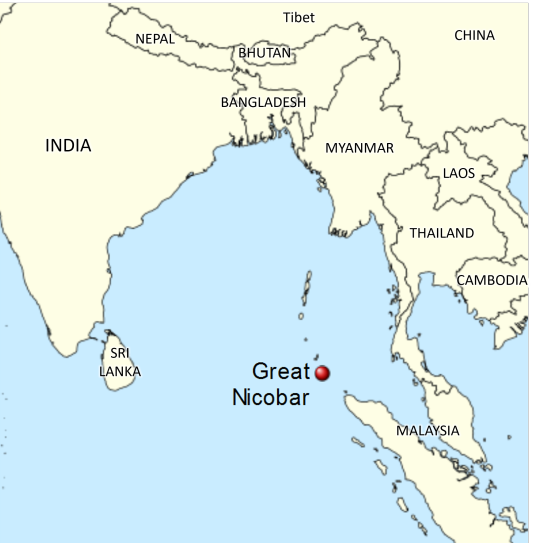
Why is there risk of genocide?
India has announced a huge construction mega-project that will completely change the Great Nicobar Island to turn it into "the Hong Kong of India".
Nowadays, the island has 8,500 inhabitants, and over 95% of its surface is made up of national parks, protected forests and tribal reserve areas. Much of the island is covered by the Great Nicobar Biosphere Reserve, described by UNESCO as covering “unique and threatened tropical evergreen forest ecosystems. It is home to very rich ecosystems, including 650 species of angiosperms, ferns, gymnosperms, and bryophytes, among others. In terms of fauna, there are over 1800 species, some of which are endemic to this area. It has one of the best-preserved tropical rain forests in the world.”
The Indian project aims to destroy this natural environment to create an international shipping terminal with the capacity to handle 14.2 million TEUs (unit of cargo capacity), an international airport that will handle a peak hour traffic of 4,000 passengers and that will be used as a joint civilian-military airport under the control of the Indian Navy, a gas and solar power plant, a military base, an industrial park, and townships aimed at bringing in tourism, including commercial, industrial and residential zones as well as other tourism-related activities.
This project means the destruction of the island's pristine rainforests, as it involves cutting down over 852,000 trees and endangers the local fauna such as leatherback turtles, saltwater crocodiles, Nicobar crab-eating macaque and migratory birds. The erosion resulting from deforestation will be huge in this highly-seismic area. Experts also warn about the effects that this project will have on local flora and fauna as a result of pollution from the terminal project, coastal surface runoff, ballasts from ships, physical collisions with ships, coastal construction, oil spills, etc.
The indigenous people are not only affected because their environment and food source will be destroyed. On top of this, the demographic change will be a catastrophe for them. After the creation of this project, the Great Nicobar Island -which now has 8,500 inhabitants- will receive a population of 650,000 settlers. Remember that the Shompen and Nicobarese people who live on this island are isolated, which means they do not have an immune system that can resist outsider illnesses. Academics believe they could die of disease if they come in contact with outsiders (think of the arrival of Europeans to the Americas after Christopher Columbus and the way that common European illnesses were lethal for indigenous Americans with no immunization against them).
And on top of all of this, the project might destroy the environment and the indigenous people just to turn out to be useless and sooner or later be abandoned. The naturalist Uday Mondal explains that “after all the destruction, the financial viability of the project remains questionable as all the construction material will have to be shipped to this remote island and it will have to compete with already well-established ports.” However, this project is important to India because they want to use the island as a military and commercial post to stop China's expansion in the region, since the Nicobar islands are located on one of the world's busiest sea routes.
Last year, 70 former government officials and ambassadors wrote to the Indian president saying the project would “virtually destroy the unique ecology of this island and the habitat of vulnerable tribal groups”. India's response has been to say that the indigenous tribes will be relocated "if needed", but that doesn't solve the problem. As a spokesperson for human rights group Survival International said: “The Shompen are nomadic and have clearly defined territories. Four of their semi-permanent settlements are set to be directly devastated by the project, along with their southern hunting and foraging territories. The Shompen will undoubtedly try to move away from the area destroyed, but there will be little space for them to go. To avoid a genocide, this deadly mega-project must be scrapped.”
On 7 February 2024, 39 scholars from 13 countries published an open letter to the Indian president warning that “If the project goes ahead, even in a limited form, we believe it will be a death sentence for the Shompen, tantamount to the international crime of genocide.”
How to help
The NGO Survival International has launched this campaign:
From this site, you just need to add your name and email and you will send an email to India's Tribal Affairs Minister and to the companies currently vying to build the first stage of the project.
Share it with your friends and acquittances and on social media.
Sources:
India’s plan for untouched Nicobar isles will be ‘death sentence’ for isolated tribe, 7 Feb 2024. The Guardian.
‘It will destroy them’: Indian mega-development could cause ‘genocide’ and ‘ecocide’, says charity, 8 Feb 2024. Geographical.
Genocide experts call on India's government to scrap the Great Nicobar mega-project, Feb 2024. Survival International.
The container terminal that could sink the Great Nicobar Island, 20 July 2022. Mongabay.
[Maps] Environmental path cleared for Great Nicobar mega project, 10 Oct 2022. Mongabay.
#shompen#genocide#stop genocide#india#indigenous#indigenous peoples#indigenous rights#human rights#anthropology#stateless nations#end occupation#andaman and nicobar islands#nicobar islands#great nicobar#💬#asia#geopolitics#ecocide#sustainability
23K notes
·
View notes
Text
i don’t think i’ve rewatched atla since becoming a committed pacifist and i just finished what was probably my tenth rewatch and i have never loved aang more. i've seen it so many times but i still came away with a new appreciation for the way the end of the story was handled. aang is the only survivor of a genocide and he is clinging to the last remnants of his culture and religion, and everyone is telling him the only way to save the world is to kill the dictator whose regime is responsible for the genocide, but to do so would abandon the deeply held beliefs of his people. if aang goes against his beliefs and kills ozai, his people's way of life dies completely and sozin wins.
aang knows it would be wrong but he can't see another way out so he prays for an answer, and the universe hears him and the spirits send out the lion turtle, and the creator answers him. and here's the thing that i never put together before today: aang would not have been able to energybend ozai if he had given in and wanted to kill him. the lion turtle tells aang that only the incorruptible can bend another’s energy, or else they will become corrupted themselves. and i think that aang, because of his love for the fire nation as he had once known it, was never corrupted by personal hatred for the fire lord or the fire nation. he was able to expertly hold two conflicting beliefs in harmony better than any adult could, the belief that ozai is a horrible person and the world would be better off without him and that he's still a human being with a life that is sacred.
and i don't think it's a matter of selfishness like some people make it out to be. aang is not some immature little kid who doesn't want to kill because killing is for bad guys. he's an incredibly wise and spiritual person who was shaped by airbender beliefs and upholds airbender beliefs, and he can see beyond the scope of this war. the balance of the world depends on the existence of the four nations, and aang does not just represent the air nomads, he IS the air nomads. he's all that's left.
despite many people’s interpretation of the four past avatars’ advice, none of the past avatars outright tell him to kill ozai. they tell him to be decisive, to bring justice, to be proactive, to be sacrificial. but none of them tells him definitively to kill him. he doesn't disobey or ignore their advice, he follows their ancient wisdom while still staying true to his beliefs. yangchen actually comes the closest to outright telling him to kill ozai (even more than kiyoshi, surprisingly) but what she fails to account for is that aang is not just the avatar, he is the last airbender, and being the last airbender is far greater a burden than being the avatar. no matter what happens, once he dies, there will always be another avatar. but if he is not careful to preserve the airbender way of life, there will be no more airbenders. yangchen could sacrifice her air nomad way of life for the sake of her duty to the world because there were thousands of other air nomads to continue their traditions. aang has no such privilege.
and it's not that he doesn't want to kill, it's that he actually doesn't think he can do it -- both that he won't be able to emotionally bring himself to kili someone, and, prodigy that he is, he doesn't have the raw bending skill to overcome a comet-powered master firebender. and then it turns from 'i don't think i can do it' into ‘i can’t do it.’ and when the avatar state gives him enough power to actually do it, he changes the answer to ‘i won’t do it.’ he overcomes all the combined power of his past lives to say no, i have found another answer and i will remain incorruptible. to kill is to maintain the power struggle of the fire nation and to reject air nomad wisdom and without airbenders the world CANNOT be brought into balance.
the only thing ozai cares about is power, and that's what the entire fight with ozai is about, physically and ideologically, because ozai only sees power in terms of force, fear, threats, and violence. to ozai, aang (and his entire people) are weak and undeserving of life because they are largely pacifists, but he fails to see the magnificent power that the airbenders do hold, spiritual wisdom and mastery of the self and contentment and joy and harmony and a deep understanding of the world that a man like ozai could never obtain. to kill ozai would ratify ozai’s worldview that power as he defines it is the most important pursuit in the world and the only way to assert one's right to be in the world is to be cruel and violent like him. i think to ozai, becoming powerless might be worse than being dead. he wants power, or he wants death, and aang gives him neither. it upends everything he believed in. aang, the avatar, but more importantly, the last airbender, armed by his past lives' power and his people's love and the spirit world's blessing and the lion turtle's omniscience (and toph's mastery of true sight through neutral jing), ends the war 100 years to the day after the air nomad genocide, in the way that his people taught him, with power that goes beyond force and violence, with spiritual wisdom, with an incorruptible soul, with mercy -- mercy that is not weakness, mercy that brings justice.
#they just don't make kids cartoons like they used to!!!!#also zuko said 'love and peace' in his coronation speech. i am squinting at bryan and mike. is that what it think it is#atla#aang#meta
6K notes
·
View notes
Note
In hindsight, the Lion Turtle ex Machina was a sign of things to come. Energy bending and the idea of taking bending away from people only makes bending into the end all be all, I mean. Yeah, it is a huge part of the identity of each nation, but it's not the sole marker of identity, nor are villains suddenly less dangerous because they don't have it.
That's because the show doesn't tackle the idea of superiority and power that exists behind the ability to bend or not bend.
It's really baffling because there are some scenes that are really really good at acknowledging it. I know people have knee-jerk reactions to the comics for good reason, but those scenes in the Promise where Zuko becomes a shrinking little boy while his father walks all over him from his prison cell even though Zuko is the Fire Lord and Ozai is powerless? Those scenes are so spot on. Ozai used bending to control Zuko for so long and make him believe he was weak, so you would think that Ozai without his bending would not still be able to psychologically dominate Zuko like that, but the reason is because it was never about the bending, but what it represents.
That's why people who insist that Azula is a superior bender and deserved blah blah blah are missing the point. That's why energy bending and Bumi getting airbending to feel more like Aang's son is missing the point. It was never about the bending. It was never about how good a bender Azula was, it was about the entitlement that the idea that she was a superior bender created in her, and if it wasn't about the bending it would be about something else, because entitled people are always going to believe they are entitled to treat other people badly, and the reasons are arbitrary.
In some ways, Ozai having his bending taken away is karmic justice, and what would hurt him the most, as someone who believed his bending made him feel superior. But in other ways, it's just validating the idea that the ability to bend makes you superior. Ozai can say to himself that Aang had to take away his bending because they just resented how powerful he was, and it doesn't address the root issue of believing he's superior in the first place.
There's also this weird undercurrent of the belief in a spiritual right to power that's built into the world building of the show and creates some weird implications. Like, okay, I can buy into the Avatar as being imbued with spiritual power as the protector of the world. Okay, it's a kid's fantasy show. It's moments when the show tries to go deeper that it tends to fumble. The concept that bending can be taken away if used to create spiritual imbalance, okay. But then, isn't the existence of the Avatar a spiritual imbalance? What if the Avatar doesn't have the world's best interests at heart? Who watches the watchmen and all that.
And then you get to the stuff where the air nomads were all benders because they were the most spiritual, except sometimes air nomads have children that aren't entirely genetically air nomad and their genes apparently determine their spirituality because why isn't Bumi a bender? Oops, let's give him bending! Problem fixed! Don't pay attention to what this says about the belief that spirituality is linked to bending or how similar this belief is to the justifications Ozai used to abuse his kids, let alone the justifications the FN uses to commit genocide. The war began because Sozin was trying to eliminate the Avatar, because having someone who could control all elements was a threat to FN superiority. Not just because of the spiritual power of the Avatar, but because of what that power represented, that firebenders were not and could not be the superior benders, that there existed a more powerful bender.
I always circle back to the fact that the show missed an opportunity to use the Avatar as a representation of harmony between bending, which is what it is in its best interpretations. Instead of having Aang use an unbeknownst power given to him by a spiritual being to prove himself the most powerful bender and turn his opponent into the weakest, have him use everything he learned from his friends, the way Zuko did. Prove that it's not about bending or power, it's about love and trust and learning to understand and empathize with other people.
79 notes
·
View notes
Text
The fact that certain people dislike Aang because
"He's a pacifist" - he's a monk, guys. Horrifying. Also being a pacifist is a crime it seems. Killing people and starting wars is more cool
"He's childish" - he's 12 🤦♂️ he matured a lot during the series and he was forced to grow up quickly like the rest of the gaang. Let alone that most of the time is copyng mechanism, he's dealing with his trauma is his own way
"He didn't kill ozai" - ah yes, still missing the point of the series in 2024. He’s the LAST airbender of a genocided culture. The way this fandom don’t value culture is insane. Which character in this series was ever asked to fore sake their culture? yeah, no one. Aang isn’t wrong for preserving his, stfu
"He had it easy" - the GENOCIDE SURVIVOR had it easy, ok. The lion turtle didn’t give Aang an easy way out. It gave him a choice, after that Aang, the AVATAR aka half spirit, prayed for it. He said he would have killed Ozai if he had no other option and he almost killed him in their fight, but he decided to stay true to himself and to preserve his culture. Aang almost died to take away Ozai's bending, easy my ass. You wanted him to be a cold blooded murderer? watch another series
"He has no development/growth" - sigh. Did we watch the same series? some of you think that you have development if you change personality/beliefs 🤦♂️ Aang has a GREAT character development. He makes choices that push him in a way that allows him to move beyond what people, his past lives included, expect of him. He became far more mature and he accepted his role as the Avatar and his responsabilities for the sake of the world. The reason his beliefs never changed is because many characters pressure him to give up his core values which come from a genocided culture. The air nomads, who raised him. If the only way you know of character development/growth is them being forced to change their fundamental beliefs, you don't know what character development means. Aang is the Avatar the world needed and he put an end to the cycles of hatred
"Aang values his culture above other cultures" - lol no he doesn't. Not only Aang is extremely respectful of other cultures (if you talk about the sea prunes again, i swear) but he values his culture because.....again, it was genocided. He never hold it above other cultures, but uses his own to make his own decisions, which is different. Mind you, other characters in the series hold their beliefs above his and dismiss his (Zuko was one of them btw). The adults, like general Fong, literally forced Aang to use violence and the Avatar state. But sure let's ignore it
"He's too perfect/he makes many mistakes" - make up your mind. Not even his haters know wtf they're talking about
"He has a crush on Katara" - how inconceivable. Damn, i'm still traumatized. Also Katara has the audacity to love him back. Horrifying
And then the shipping reasons....yeah i'm not gonna bother here, braindead takes from delusional people
All opinions that i will never ever take seriously, sorry
Free Aang

#avatar the last airbender#atla#aang#avatar aang#the gaang#pro aang#aang deserved better#atla meta#the gaangs
132 notes
·
View notes
Text
What Does the Lion Turtle Chant Mean?
A podcast episode about the spirituality of Avatar: The Last Airbender.
Transcript Preview:
Many people have told me they struggle to take Sozin’s Comet seriously because they would have killed the Fire Lord without hesitation. And, look, as far as I’m concerned — if you’re willing to kill a genocidal colonizer, good for you! Many blessings upon your journey! And the show isn’t trying to dissuade you.
Aang is not the only voice of wisdom in Avatar. He’s not a puppet through which the text articulates its meaning. Avatar is about cultural exchange. When one character says what they think is true, that isn’t necessarily the moral of a story. That’s one voice, and the story is a conversation. So, I don’t think that Sozin’s Comet is using Aang to say “Hey, you, you, looking at the TV, you personally should never support violent revolution!” Water Tribe culture doesn’t seem to have any problem with killing on the battlefield.
When Sokka lops off the Melon Lord’s head, there’s some very clear indications that we’re supposed to be troubled. The musical cue, Momo eating the melon, he lingering focus on Aang’s reaction … But I don’t think this scene is meant to communicate that Sokka is a bad guy. Or that soldiers are inherently bad people. I assume that Hakoda, Bato, and Tyro killed people. These figures are portrayed as admirable, and even as mentors.
The scene in which Sokka kills the Melon Lord is there to illustrate the difference between Southern Water Tribe culture and Air Nomad culture. Sokka’s journey is about embracing and reclaiming all the parts of his culture that the Fire Nation tried to destroy. He wasn’t able to go ice dodging or to train as a wolf warrior, but he has found a way to become a strong, protective man anyways. And that does mean that he’s willing to kill or die for a cause he believes in. This scene doesn’t communicate that Sokka is a bad person. It communicates that Sokka is walking his own path, and that Aang is walking a different path. But the show doesn’t try to tell you one of them is wrong and the other is right.
At the same time, I think we need to remember that Aang is saying something he believes. It’s not just an emotional problem for him.
Aang gives multiple related, but different reasons not to kill the Fire Lord.
“I didn’t feel like myself.”
The Fire Lord “is still a human being.”
Killing goes against “everything the monks taught me.”
“All life is sacred.”
In Southern Raiders, he also makes a more general claim that “violence is never the answer,�� but I think that the writers had to use the word “violence” as a euphemism. In our normal usage of the word, punching somebody would be a “violent” act. Aang clearly has no problem whacking people over the head or shooting wind at them. I think this is a way of making the show more kid friendly, and that what Aang actually means is
“[Killing] is never the answer.”
Some of these claims are about Aang as an individual. He’s saying he doesn’t feel like he, specifically, can kill someone. That it goes against the values of his culture. And some of these are universal claims. He’s saying no one should kill, not ever.
But he also believes in a separate ethical mandate. As the Avatar, he has to protect the world. In this lifetime, that means preventing the Fire Lord from burning the Earth Kingdom.
This is a story about moral standards, and they seem impossible to live up to. There’s no easy answer. If you believe that murder is wrong, and you believe in the duties of the Avatar, then you have a conflict of values, not just emotions. In order to understand the Buddhist themes of Sozin’s Comet, we have to understand Buddhist ideas of morality.
This podcast episode
Bluesky
Substack
Twitter
Patreon
Nate's short story about Buddhism
Transcript with Citations
269 notes
·
View notes
Text
The Good & the Bad: On Aang (Not) Killing the Fire Lord

I recived this asks forever ago, trurly sorry anon, but I'll keep my apologises for the end. I'd love to answer that!
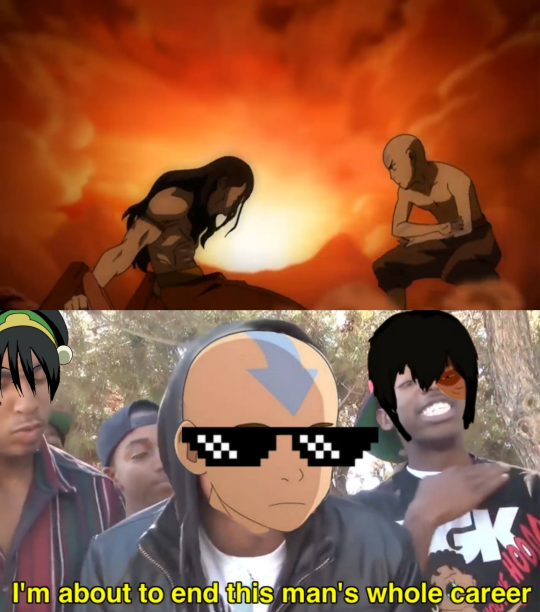
If you're asking me, this is way better than """killing him""". Case closed.
Getting this cleared up: The show didn't say that Aang is morally superior for this. It was solely about staying true to himself. Not a moral high ground.
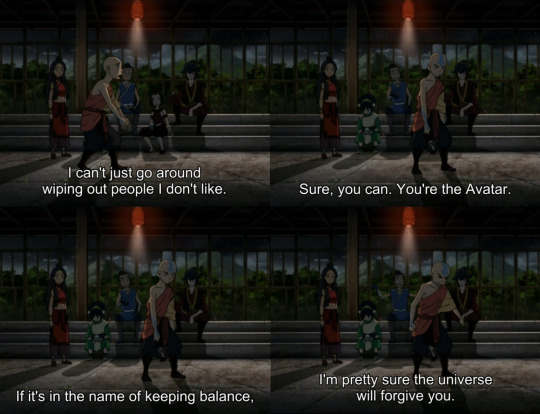
So when I hear people say it's problematic because it implies that sparing imperialistic dictators has some intrinsic goodness to it, (Ahem-Lily Orchard), I just can't agree. It was never about universal ethics, it was about Aang's culture and values.
Why Is This a Good Thing?
Aang loves his culture, and takes a lot of pride in it and its values. (See: in The Southern Raiders his first go-to to convince Katara to spare Yon Rah is his culture, rather than what such act would do Katara herself). He would have been ashamed if he had broken them. But right now they clash with his Avatar duties, with god-knows how many lives at stake. He needs to let go of his pride & shame, and become humble.
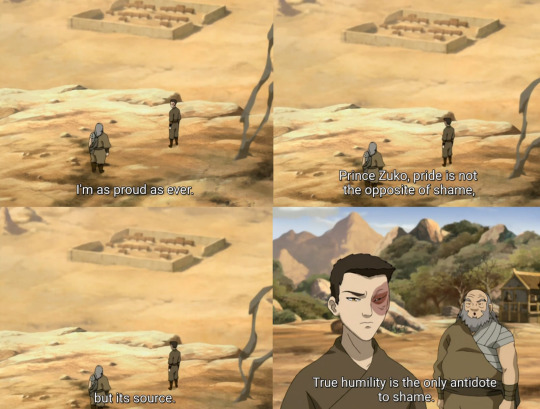
Just like Zuko humbling himself to the GAang before they accept him, or Sokka humbling himself to the Kyoshi warriors and Master Piandao, Aang could only speak to the the lion turtle after he'd given up, after he was humbled.
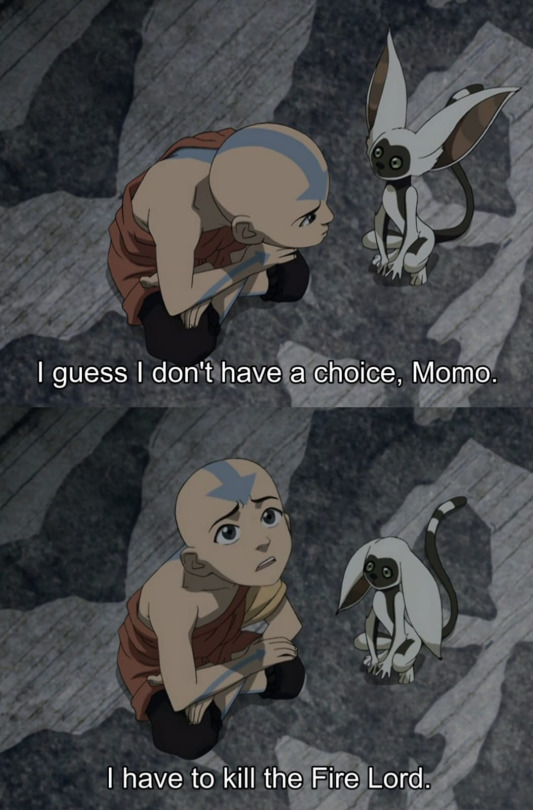
Even beyond Aang, it enhances the show's themes at large. A theme in A:TLA is paving your own path, and that you can do what you want despite the pressure. Your true destiny will come, you might be surprised by it, but it's yours and you're free to carve it.
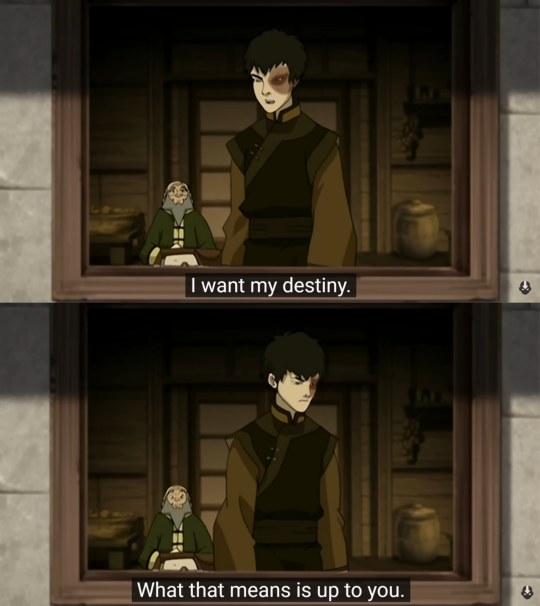
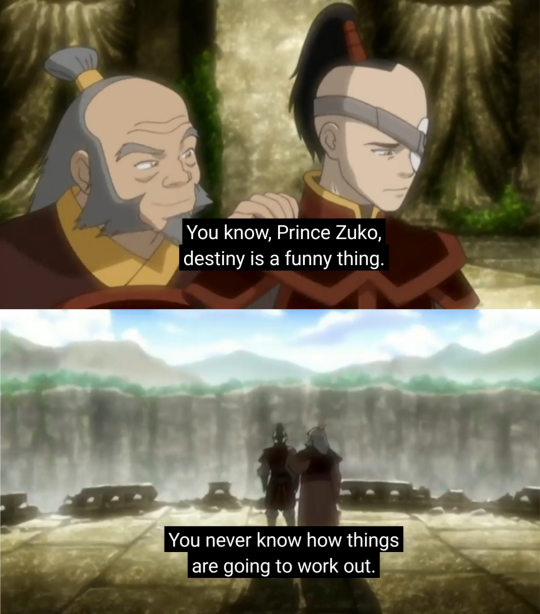
You just have to keep going, to continue to do the right thing, and your destiny will find you. Things have a way of working out in the end, eventually.
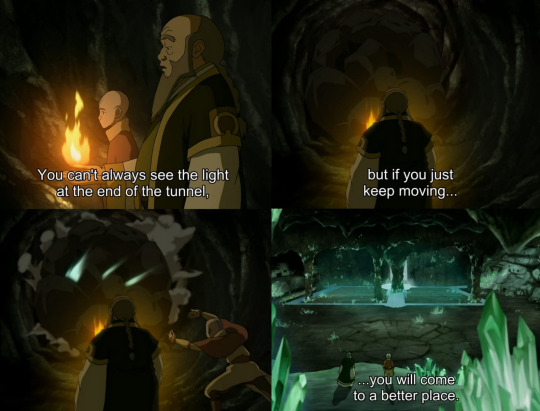
Sparing Ozai serves the theme, thus the show overall. Everyone told him it's his destiny to kill the Fire Lord and end the war. But he didn't agree, paving his own path, his own destiny, and all was well. The pieces fell in their place.
It is s amplified by the fact that if you read between the lines, he actually did follow all the previous Avatars' wisdom besides Yangchen's.
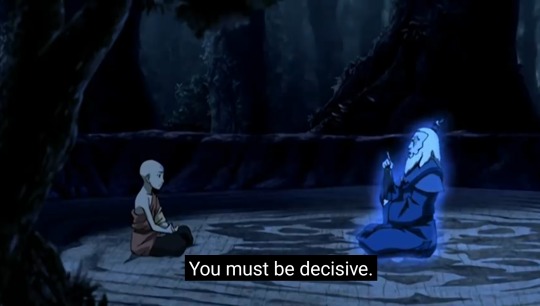
Aang knew what he wanted from the start. He isn't going to kill the Fire Lord. People (rightfully) tried to pressure him, but in the end, he stuck to his decision.
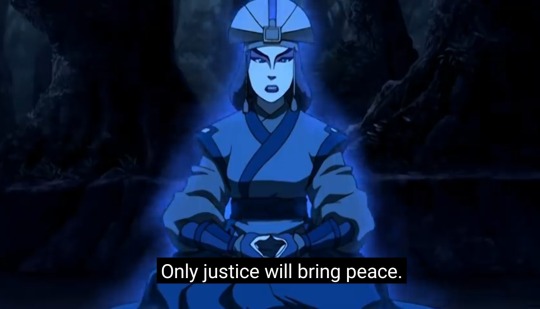
Justice was served. Aang took his bending away and put him to rot in prison for the rest of his life. There's more than one way to execute justice.
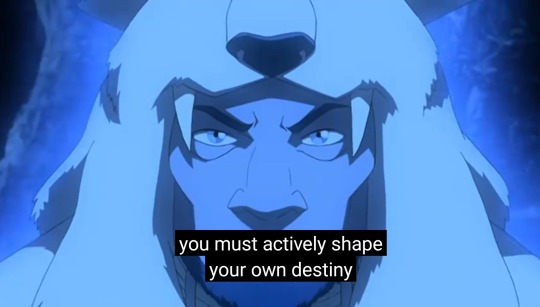
"... and the destiny of the world". That's exactly what Aang did. He followed his own path (staying true to himself) while saving the world (ending Ozai regime).
So that leaves us with Yangchen's advice. The one he didn't follow:
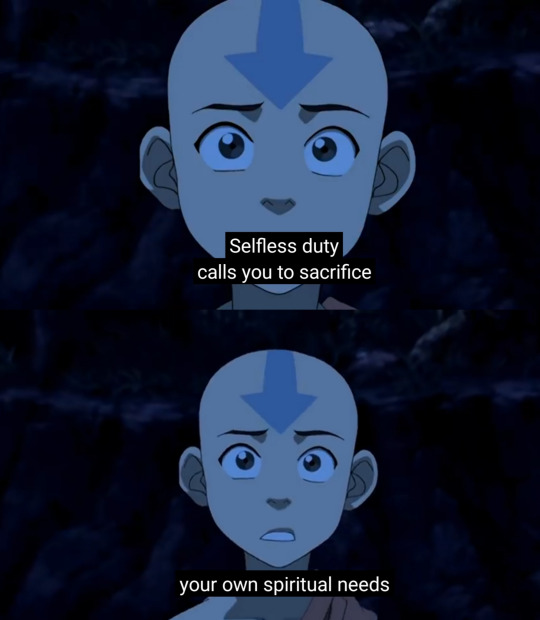
This opens another layer to this. Why doesn't Aang take the advice of a fellow Air Nomad? The one he should relate to the most? Because despite both being Avatars and Airbenders, Aang is the last. They're not the same. Yangchen is speaking from a place of privilege. She can carry the weight of the Avatar and not worry about the Air Nomads. Notice the wording: "spiritual needs". But it's deeper than that. In her time, they were there, they'll preserve their culture and values. Aang doesn't have that.
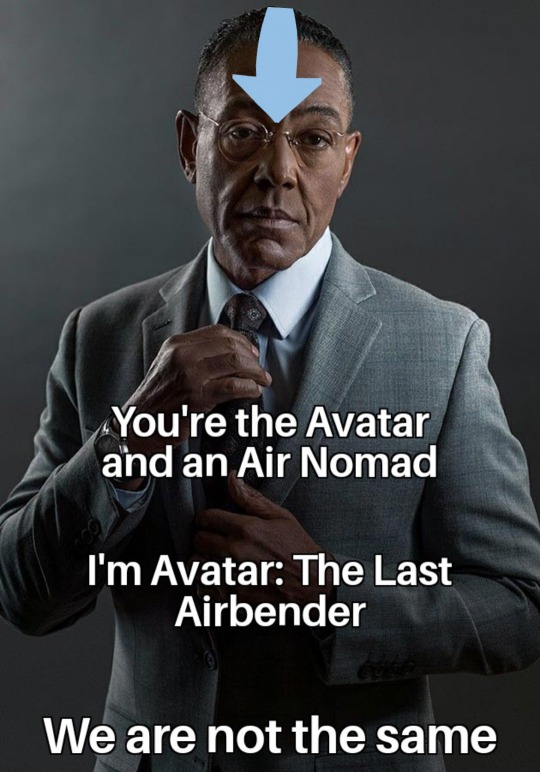
He's Avatar: The Last Airbender. He has both weights to carry. The decision to spare the Fire Lord, while protecting the rest of the world, is embedded in the show's title.
There's also something so incredibly powerful in Ozai being defeated specifically with Air Nomad values. A 100 years ago, during Sozin's Comet, the Fire Nation started the war by genociding them. When it comes back, the Avatar, the last Air Nomad, ends the war and stops the next genocide while preserving their values. The Fire Nation isn't going to push him to taint (one of) the last living aspacts of the Air Nomads, and Aang is shouting it – in the very same day the disaster occurred.
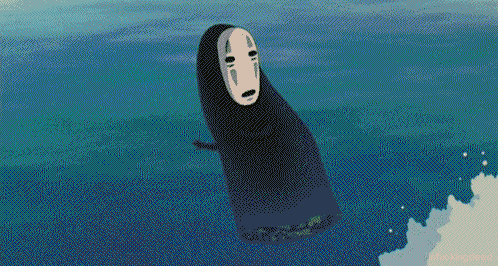
(Additionally I view this as a land mark of his character development since Siege of the North. He used spirit powers for murder, now he's using them for mercy).
(A:TLA is also a show made with kids in mind. They may not be able to make Aang kill Ozai. He got his bending stolen and sentenced to prison for the rest of his life. That's a more than serviceable punishment for a show aimed at kids).
(Ps: If Ozai had died Zuko would never have found out where his mother is).
The concept is fantastic. Nothing wrong there. But now, it's time for the critisism.
What's the problem then?
Despite looking in internet forums, it's entirely possible that I missed some things. With that being said, the Lion Turtles could have been foreshadowed better. As I stated, I don't mind it. But as far as I recall, it was foreshadowed once in The Library, and that's it. (Edit: It's also foreshadowed in Sokka's Master and The Beach, but the point still stands).
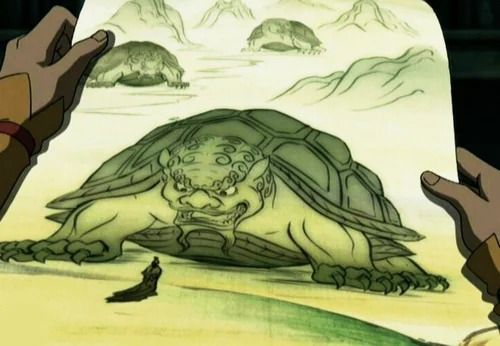
The Lion Turtle is a twist, it subverted expectations, but that doesn't mean it has to be a deus ex machina. That's what foreshadowing is for. It's the literary device to making a plot twist feel believable. The result is many fans, including me, feeling as though it came out of no where, even though it didn't.
Overall, I love that Aang spared Ozai. It ties into the themes of the show and Aang's role as the last airbender. It makes perfect sense, it's rather beautiful. However, I do wish the foreshadowing was better.
And for Anon, to apologize for the wait, I dedicate you this meme:
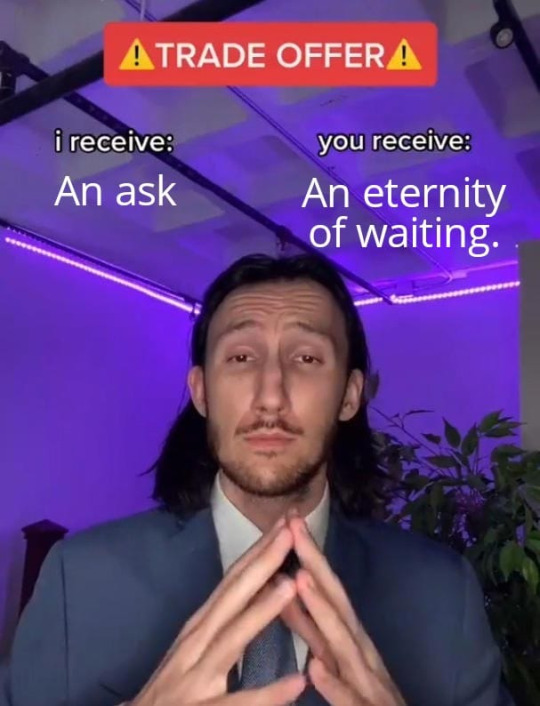
#tw genocide#aang#avatar aang#lion turtle#ozai#fire lord ozai#atla meta#avatar meta#aang meta#atla ending#atla finale#avatar: the last airbender#avatar the last airbender#air nomads#yangchen#kyoshi#roku#kuruk#avatar yangchen#avatar kyoshi#avatar roku#avatar kuruk#tw imperialism#avatar the last airbender meta#atla analysis#aang analysis#atla aang#atla critisism#iroh#uncle iroh
244 notes
·
View notes
Note
I have a question for you!
Do you think Aang is the Zseto of the Air Nomad?
I've seen people theorize about this and I'm a little confused myself. When you try to defend Aang, people get a little narrow-minded because they think you're putting him on a pedestal, that he's perfect, etc. It's okay for characters to have mistakes. Every avatar has mistakes, which makes them unique. I know some Aang stans are pretty aggressive. But for me, that's not the case. It's just that they're trying to expand other perspectives of Aang's character. There are so many debates about his character, but these ones just baffle me. One of the reasons I like Aang is because of his mistakes, how he owns them, and the consequences. Overall, I wanted to hear your thoughts, since you have more experience in Korra's story, with all your meta and analysis on your blog.
Here are some arguments that pushed this theory:
The fact that Aang had to rebuild the air nation left the so-called peoples in disfavor.
Aang in the comics who is too restricted to changes, technologies, which might have brought the benders and not the benders to conflict.
The way Aang treated his son Tenzin and taught him to be an airbender. Which led Tenzin to be less open to future Airnomads. The fact that he is a bad father because he focused on Tenzin and left his others.
These are not my thoughts, but arguments that validated this theory! I would be happy to hear your thoughts!
(I assume that by 'Zseto' you meant 'Szeto' and mistyped lol)
Huh, I've only ever heard the argument Aang being similar to Szeto only a few times ans never really put a lot of thought into it. I'll be honest, I don't really have as much of a hate for Szeto as a lot of people in the fandom do. Like yeah I'll still make jokes about Tax Boy McNationalist, but from what I know of him, he genuinely seemed to do his best. Like he grew up in a time of conflict, economical strife, plagues and natural disasters. There was a lot of shit going on in the Fire Nation and the Avatar usually goes where they're needed most. And I think a lot of people forget how much a poor economy can ruin lives.
Was he biased? Sure, but I think it's inevitable that most Avatars will be biased towards their homeland and loved ones. Look at the difference between how Korra handled the Southern Water Tribe being taken over by the North and how she handled Zaofu being invaded by the Earth Empire. And don't even get me started on Roku. Even Wan seemed to have his biases when dealing with his friends from the Fire Lion Turtle.

Singling out Avatars like Szeto or Aang really is pretty pointless.
Particularly with Aang, who has every right to be biased. Like, we need to remember that the airbenders were not only wiped out but also wiped out 100 years ago. And if Aang wants to perserve their culture, he has to scramble to find artifacts, and immortalise what memories he has in that lil twelve year old noggin of his before he forgets.
You lose track of cultural items surprisingly fast, I know this as a Pole. You won't BELIVE how much of our art and other historical items are still missing because some asshole nazi decided he wanted a souvenir from that time he helped commit a genocide.
Does Aang come off as overzealous, a bit preachy and occasionally overly strict with his beliefs? Yeah a little, but he has reason too. Aang is an individual with extremely strong convictions and firm beliefs, which is admirable for someone so young. It can cause interpersonal issues, and can be annoying if you can't empathise with him. But I think what we need to remember is that with a philosophy as deeply spiritual and internal as that of the Air Nomads, one infraction can seemingly feel like you're failing it. We must remember that to Aang, giving up Air Nomad philosophies even once will probably seem like betraying the legacy of his people.

Aang is a flawed character, but all characters are flawed and multi faceted. That's good storytelling, babey.
Ok, but onto the points you raise
1. Aang prioritising the Air Nation over others
I think this is a pretty silly argument, since Aang's first act as Avatar was to literally save the world from the Fire Nation, but ok. Let's play along. I think this is also unfounded, since we see Aang having so much influence on the other nations, being involves with their leaders and assisting the civilians. I also love seeing Aang's very unique perspective on engaging with the other nations.

As a genocide survivor, we see Aang support Katara, another genocude survivor in reconnecting with and rbuilding her culture. And as someone who existed 100 years ago and travelled around a lot, Aang has knowledge of other Nations that has since been lost to time and the war. He remembers natural wonders and sacred places in the Earth Kingdom, and encourages the children of the Fire Nation to reconnect with the expressive, artistic side of their heritage which has been stomped down by the new utilitarian regime of the Nation.
And I swear to god if someone brings up Aang not liking sea prune soup and being mildly startled by an animal pelt I will shoot them.
For better or for worse, Aang also created Republic City, which was an attempt at bridging the divides formed between the three nations.
2. Aang's aversion to technology
Before I touch on this point, I think we need to remember that atla is happening smack dab in the middle of an industrial revolution. And Aang has existed 100 years before this industrial revolution. Imagine showing a 12 year old from the 17th century a steam locomotive I think he'd be baffled and disconcerted.
Furthermore, in 2 out of three of the times we see Aang upset about technology it's because from his perspective, suddenly there's tons of machinery sprouting from places that were important to him. In the first instance, it's at the Northern Air Temple, a place that probably housed at least a few of Aang's friends. And the second is in a sacred area. Not to mention that these renovations were entirely uninvited and unexpected, so I think it's only natural thay Aang feels violated on behalf of his entire culture and people.

In the third instance, Aang expresses frustration with industrialisation because it caused pollution and antagonism between benders and nonbenders. His frustration is understandable. He is essentially witnessing a huge change to what he percieves as the natural order, and from his subconscious perspective, this has all happened in a short amount of time.
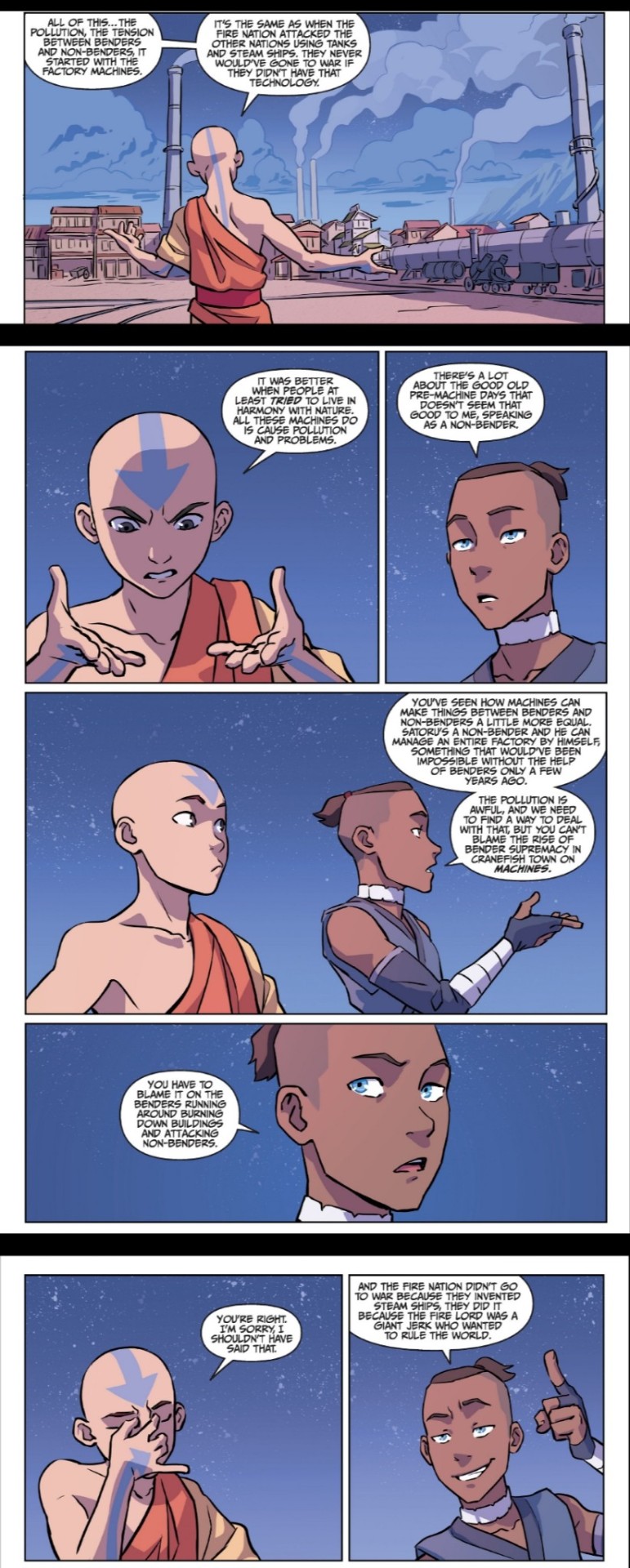
But we also see Sokka quickly check Aang's frustration, reminding him that innovation can be a good thing and that it's bad people who use it irresponsibly. And Aang apologises and agrees. I think this is what people often forget. Aang is very good at listening to people and taking in their perspective.
Aang's constant struggle with how the world has changed is one of my favourite aspect of his story since it really emphasises how lost and alone he could feel in this world.
3. Aang's poor parenting and that it led to Tenzin struggling with the future airbenders
I honestly dislike the blanket statement that Aang was a bad father. Flawed? Yeah, totally. But bad? Absolutely not.
Even Bumi and Kya admit that their father loved them and that he cared for them, but was held back by his responsibilities.

I think most children of Avatars will have at least a small amount of resentment towards their parent's status and the responsibilities and pressure it lays upon them. Plus, Aang and hid children had the added weight of an entire genocide on their shoulders.
And between managing a world that has only recently become peaceful, trying to rebuild a nation and doing regular Avatar stuff, it's not hard to see how Aang may have struggled to give his children time. Tenzin just happened to fit into one of those goals enough that Aang could bring him along.
This did cause Tenzin a lot of stress and feelings of pressure. But Aang always tried to reassure his son. It just sometimes happens that children internalise the wrong message.
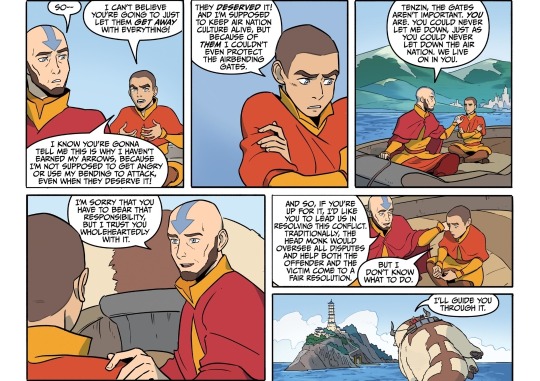
And Aang could never have forseen the return of the airbenders through Harmonic Convergence, so how could he have prepared Tenzin for handling a bunch of terrified, newly bending people who suddenly became a part of an almost extinct culture.
Aang prepared Tenzin to educate Air Acolytes, nonbenders of different nationalities who willingly joined the cause of rebuilding the Air Nation and were already interested in the culture.
And to Aang and Tenzin's credit, the one Asir Acolyte who got airbending, named Otaku seemed to be genuinely enjoying all this.
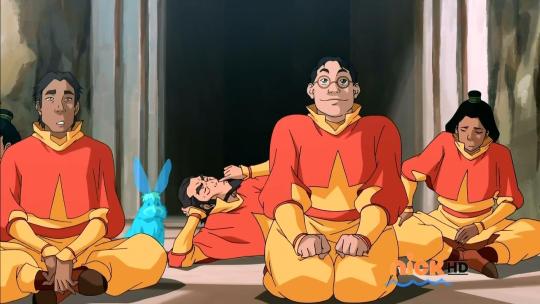
Look at his nerdass. He's having a whale of a time.
I think while these criticisms are valid to some extent, they are overblown. Aang's flaws exist to make an interesting story and to make him an interesting character. I don't want to say every action of Aang's is entirely right and morally correct all the time. But every action he takes is understandable. We can follow his thought process and I think that's very good writing.
I also find it a bit of an annoying trend to compare Avatars. I've seen people do it with Aang and Korra and it always rubbed me the wrong way. Every Avatar is unique and has their own story, personality, morals and flaws. I love that about the Avatar franchise, but I see a lot of people so resistant to anything that doesn't fit their own narratives.
#also how is szeto even pronounced btw#i know i probably misprounce it bcs i read it like its a polish word so like 'sh-eh-to'#aang#avatar aang#avatar szeto#szeto#bumi ii#tenzin#kya ii#avatar#legend of korra#tlok#the legend of korra#avatar the legend of korra#atlok#lok#sokka#avatar: the last airbender#the last airbender#avatar the last airbender#pro aang#aang defense squad#aanglove
57 notes
·
View notes
Text
Cultural Practices: Lion-Turtle Chant
youtube
The Lion Turtle’s Chant is inspired by a real Chinese Pure Land Buddhist chant known as Nianfo (念佛) in Mandarin. The original chant goes:
Nāmó Āmítuófó (南無阿彌陀佛) / Bow before the Buddha of Immeasurable Light
The Lion Turtle’s Chant modifies this slightly to:
Nāmó Āmítuófó Shīdì (南無阿彌陀佛师弟) / Bow before the Buddha of Immeasurable Light’s Disciple
Which is an absolutely fascinating addition to me. Amitabha, the Buddha of Immeasurable Light, is an enlightened being who possesses pure perception and freedom from worldly attachments. By having the chant state that respect must be paid to the disciple, it acknowledges Aang’s imperfections despite his good heart and grand status as Avatar. It’s shown explicitly in the show, after all, that Aang is very much incapable of letting go of all his attachments.
Though I also wonder if, by definition, all Avatars are really just permanent disciples of enlightenment. After all, Yangchen even says:
Many great and wise Air Nomads have detached themselves and achieved spiritual enlightenment, but the Avatar can never do it. Because your sole duty is to the world. Here is my wisdom for you: Selfless duty calls you to sacrifice your own spiritual needs and do whatever it takes to protect the world.
Some very interesting ideas posed by a simple musical score.
Like what I’m doing? Tips always appreciated, never expected. ^_^
https://ko-fi.com/atlaculture
#avatar#atla#Avatar The Last Airbender#cultural practices#mood music#I guess that makes the Lion-Turtle the Amitabha Buddha#also the pronunciation of the chant isn't very good#but that's always been an issue in Avatar#alas nothing is perfect#Youtube
606 notes
·
View notes
Note
I used to just think Zutara was cool because Zuko and Katara had that whole fire-water duality, had more chemistry with each other than their canon love interests, Kataang gave me this sexist pseudo-incestuous vibe while Mai was just way too under-developed to interest me (Zuko gets the most character development out of all the characters but they pair him off with the most boring character in the series?).
Now when I actually think about it more deeply, Zutara genuinely made more sense for the narrative and characters too. Aang was told he had to let go of Katara so he could become a fully realized Avatar but then he just gets a deus ex machina so he doesn't have to. They dropped an entire arc just for Kataang to get together and made it happen in the most stupid way. The lion turtle deus ex machina was already badly done but at least it sorta made sense with the lore. The rock was just beyond ridiculous. Aang solved his problems by randomly hitting a rock even though they already established how Aang had this unhealthy attachment to Katara because she was his coping mechanism for his lost people. Instead of letting her go, Aang keeps that attachment and becomes even more possessive of her. He never learns to prioritize the world over Katara even though it is his duty as the Avatar! He didn't have to sacrifice or learn anything to achieve his goals and the way he became a fully realized Avatar NEVER made any sense. Katara and Aand were not always intended to end up together if you look at the IP Bible. Katara goes back to the SWT to help rebuild it while Aang goes looking for the hidden Air Nomads. There's hints early on in Book 1 that the Air Nomads are still alive (like how Aang was able to get a bison whistle from some merchants but they never explain where they got it from).
Meanwhile the whole Maiko relationship seemed like it was a metaphor to represent Zuko's false destiny and dissatisfaction with his life since Mai encouraged him to sink into his bad habits and ignore everything else, and Azula actively encouraged them to get together so she could control Zuko easier and keep him in the Fire Nation. Zuko leaving Mai behind felt like him embracing his true destiny. This entire thing falls apart when they get back together though, and them being so toxic in the comics is just further proving how dysfunctional they are (like, do they think this is going to sell us on the ship?). I also thought it was strange that apparently Zuko and Mai liked each other since they were kids but Mai never bothered to write him his entire banishment, Zuko never thought about her, Iroh never mentions her, Zuko was totally fine with going on a date with Jin (which Iroh also encouraged), and Iroh thought Zuko and Katara would make a good couple as soon as he saw them interacting as friends. It makes me think Bryke just created Mai and put her with Zuko as a way to discourage Zutara shippers but then forgot to develop her properly. Zuko doesn't even think about Mai after she risked his life to save him lol.
I'm about to make this a long answer, sorry about that :)
I love narrative, and I love to analyze how it is built. Narrative is the way a story is shaped to express its themes. Narrative is using the events within the story to build metaphors. Narrative is the smart foreshadowing, the parallels, the foils. Narrative is intentional, until it isn't.
I am not a professional. I do not have a college degree on this subject. I just like to think about what can make writing be great or lacking. I am merely expressing my personal opinion on this show and these characters, not stating an universal truth.
ATLA is such a well-written show. It treats its themes maturely and builds the story and characters masterfully. Of course, it isn't perfect, as nothing made by human hands is meant to be. ATLA has issues with its storyline and characters and, ultimately, with the narrative itself.
Aang's character arc is different to Zuko's in that, while Zuko's is focused on change, Aang's ultimately ends with him standing his ground. (And isn't that poetic? That in order to grow they need to embrace the philosophy of their opposite element?)
Zuko was forced to change in order to survive from a very young age. He learned to suppress his true, compassionate nature, to become The Perfect Prince—that which Azula embodies. When Zuko fails to do this, he is burnt and tossed away and forced to change once more. He has been hurt and thus is the farthest he has ever been from his true self—Zuko almost forgets who he is.
Zuko's arc, in that way, is similar to Aang's. It's about staying true to himself, but also about learning, about opening his eyes to the horror and using that same passion he has always had to do the right thing. Zuko changes, not into the person he was, but into someone who could, in the future, turn into the better version of himself.
Aang is different. Aang is a child born into peace, who does not have the personal, terrible experience of his people's genocide or the hundred years of war that have left the world wrecked. Aang's arc is about changing and learning and adapting to this new reality, about accepting his role as the Avatar. But it's also about standing firm and saying, "This is who I am, this is where I come from—pain will not break me".
Aang's struggle to control the Avatar State was all about that. The Avatar State meant that Aang lost control. It meant the pain and the hurt had turned him into a thing of anger (righteous as it was) and instinct and awe. Aang needed to be at peace with himself in order to control the Avatar State.
That tiny rock at the final battle felt like an easy way out. It felt like taking from the sheer terror of watching yourself almost kill a man as if from afar. The real moment of triumph for Aang in the finale happened when he stopped. It happened when he took control back and ended the Avatar State, stopping himself from betraying what he believed in.
Was not killing Ozai truly the best choice? I won't get into that debate. I know where I stand on it, but it's not really the point I'm trying to make here.
Aang's triumph, character-wise, happens when he stands his ground and refuses to abandon who he is and what he believes in. And for someone whose flight or fight response almost always turns to flight, this is a huge deal.
Now, where do Katara and Mai stand on this?
It has always been clear to me (even as a Maiko shipper) that Mai was always supposed to be a narrative device. Her relationship with Zuko is supposed to give us, the viewers, and him, another reason to see that this isn't the life he wants, that everything isn't perfect even when it should be on paper.
Zuko goes back home. Zuko is welcomed by his nation with open arms. He is revered. Loved. His father tells him he is proud of him. Zuko has a doting girlfriend—a beautiful, noble girl who can kick his ass and is everything a Fire Prince could wish for. She is adequate and things with her are easy, untroubled. Zuko has everything he could wish for.
And yet he is not happy.
Mai and Zuko have issues that should not be pinned fully on either of them. They had trouble comunicating. They wanted different things in life. They had different ways to look at the world. Different ways to look at each other. Different ways to cope. Different ways to express themselves. Different expectations.
And that's okay. It's possible to make a relationship like that work. Nobody is perfect and no relationship is flawless. Opposites attract and it's possible to find a middle ground in which they can both be happy.
Except they never truly did.
Mai and Zuko's relationship was a plot device. One that did its job damn well... Until it didn't.
If your relationship with the girl is supposed to symbolize the lowest point in your life, and going back into being someone you don't like anymore, then why get back to her when the story is over?
As for Katara, well...
Many things have been said about the abandoned Letting Go Of Katara arc. I'd like to avoid that discussion right now, if that's okay.
I think Zuko and Katara's relationship would have made a lot of sense both narratively and thematically, but also (and most importantly) it would have made sense character-wise.
Give them a few years, let them explore the beautiful friendship they had at the end of the series. Let them find themselves and grow into their roles in this different, exciting new world. Let them reconnect.
If they fall in love in the process? Well, maybe it was a long time coming.
#dema answers#This isn't really anti Maiko or anti Kataang. Maiko was my OTP for the longest time and I thought Kataang was cute on my first watch#There's no reason to be upset with canon. It is what it is. We have the chance to explore it and wonder how it could have been even better#That's the beauty of fanwork
107 notes
·
View notes
Text

Mother Rhoyne, the spirit of the Rhoyne river and goddess of the Rhoynar. She sits atop one of her turtle consorts, an "Old Man of the River." Mother Rhoyne is still worshipped in parts of Dorne, among the nomadic Orphans of the Greenblood River.
Her pose and costume are drawn from South Indian goddess depictions; she holds a catfish and wears a necklace of freshwater pearls.
25 notes
·
View notes
Text
zuko headcanon time!!!!
He always knew that firebending was never going to be his strongest weapon, not with Azula around. His baby sister, a firebending prodigy with blue fire and lightning. So, with the resources he was allowed, he was able to study with Master Piandao. The art of the sword came easy to Zuko. Mostly.
He had trouble with his footwork. Always springing into action too soon; unable to stay patient and wait for an opening attack. Many of the reasons he struggled with his Katas. Zuko was a problem solver, he was able to make up for his mistakes with quick thinking, but Piandao wanted to limit any sort of mistakes at all. So, he proposed that Zuko take ballet once he arrived back home. A dance that required discipline, strength, and patience.
Zuko had vehemently denied it, arguing that it was going to make him look stupid. Azula already had enough to make fun of him, he really didn’t want to fuel the fire of his sisters insults. Piandao wasn’t forcing him to take ballet, only trying to help him better his already remarkable skills. He told Zuko to read up on it, maybe he would even think it was “cool”.
And, well, that’s just what Zuko did. In the palace library, he searched through scrolls about various cultural dances. Ballet came from the Air Nomads, and later enriched (stolen) into the fire nation. Zuko looked through the drawings, captivated by their flexibility, and wincing when he saw that they were standing on their toes.
He ran to his mom, doing everything to avoid running into Azula let alone father. Ursa was outside in the garden, throwing vegetable scraps to the turtle ducks in the pond. Zuko scared them away as he rushed to her side, practically shoving the scroll in his poor mother’s face. Ursa, ever the saint, took the scroll from Zuko’s vibrating hands and arched her brow towards him.
“Ballet?”
“Master Piandao told me It’d make me a better fighter.” Not true, but also not entirely a lie. Zuko was just embarrassed on how much he wanted to take a dance class.
Ursa smiled, rubbing Zuko’s hair affectionately, “Okay, then. I’ll see what we can do about getting you a private instructor.
And that’s how it began. Almost every morning, before his training with his firebending teachers, Zuko met with a strict, rather terrifying, woman named Arami to learn ballet. Despite her rough around the edges personality, Zuko liked her. A lot more than his bending teachers. He listened to her intently and hung off her every word.
It was around the same time Zuko found his interest in the theatre. Arami shared scrolls with him, and taught him how various dance styles were incorporated in his favorite plays. He would take her practices and merge them with his kata’s and again with his swords, those forged by him and Master Piandao. For once, he felt confident in his own ability, enough to discourage Azula’s taunts. It was even okay when his mother left, grandfather died, and Father was crowned firelord.
And then, he was burned and banished, outcasted from the fire nation with an impossible task. His passion and his love was snuffed out in an instant and replaced with anger as he lost sight of who he had built himself to be.
#atla#zuko#avatar the last airbender#zuko headcanon#this is just a ramble of thoughts#not that coherent#stemmed from the idea that the gaang learns he used to do ballet#atla headcanons#atla zuko
66 notes
·
View notes
Text

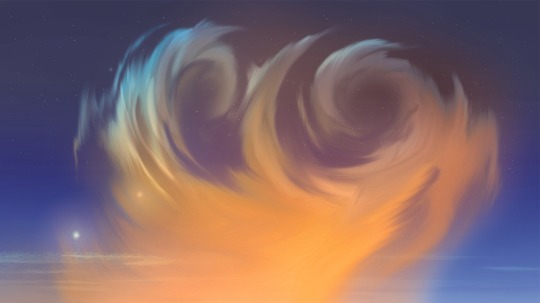

Story Summary: Takes place post-Ahsoka S1. Stranded on Peridea, Sabine, Ahsoka, and Huyang pass the time listening to tales of Ezra from the Noti, one of which reveals the origin of their mysterious starbird medallions.
Happy Birthday to the one and only @alphaofdarkness! Hope it was a good one this year and thank you for being such a lovely friend and super talented artist for our fandom.
It had been another long day of travel for the Noti convoy and their new protectors. In the week since Thrawn, his Imperial Remnant, and a stowaway Ezra had made the escape back to their home galaxy, things had since settled down back into a mundane routine.
As evening fell, the Noti prepared a feast to celebrate another safe journey. In middle of camp, a massive cauldron hovered over a fire, boiling with some delicious smelling stew. Ahsoka took a sniff, her stomach rumbling at the aromas drifting in her direction on the gentle night breeze. Folding her cloak over her body more snugly, she took mental stock of their journey so far.
The nomadic bandit clans that roamed the wastelands of Peridea were dangerous, despite their primitive weaponry. The Noti had no real way of defending themselves, outside of the rock-like shells that were an extension of their physicality. But Ezra's presence had clearly left a mark; the turtle people were resilient and clever, relying on their wits and ingenious solutions to avoid a head-on confrontation with their ancient enemy.
It probably also helped that they now had two Jedi to protect them, instead of one. Although two was admittedly a stretch since Sabine was in training. She had pulled off some amazing feats of the Force since her reunion with Ezra, but her ability to wield it fully was still erratic.
Ahsoka wasn't worried, however. They had nothing but time now and Sabine was a fast learner . . . once she actually started listening, that is.
Sitting on wooden stump that serviced comfortably as a seat, the smell of tonight's dinner wafted through the air; a thick, creamy seafood broth that was a Noti specialty, according to Huyang. The droid had been chatting constantly with the turtle folk in attempt to learn their native tongue to better learn about their culture and facilitate easier lines of communication in case of emergency. Ahsoka had been trying to learn the language herself but could still only understand it roughly and was still unable to speak it.
Huyang stood near the fire, observing the Noti cooking. His vocabulator emitted a strange series of chirps and clicking sounds to which the turtle people responded in kind. When they finished, Huyang's mechanical head turned to find Ahsoka. She waved at him from her spot on the rock, a few meters away.
He gave a thumbs up. She blinked at him and then - hesitantly - gave one in return.
Familiar footsteps came up behind her. "Seems like we'll actually be able to taste tonight's supper then," remarked Sabine.
Ahsoka smiled, turning to find her padawan squatting down to take in the scenery before her. Every night, the two of them would take turns patrolling the perimeter, ready to send an alarm in case of a late-night bandit attack. So far, the bandits didn't seem interested in the Noti throughout this latest journey.
In fact, they seemed eerily quiet. The Noti elders had said that it was unusual - but not uncommon - for the bandits to not be seen for quite some time. There was no centralized leadership among the bandit clans; they were all separate and distinct, sometimes warring amongst themselves.
Ahsoka hoped that was the case. She knew that her and Sabine were not the only ones on the planet: Baylan Skoll, a fallen Jedi, and his apprentice, Shin Hati were also here. Whether they were together or plotting separately, only one thing was sure: neither of them were up to anything good.
But that was a problem for another day. For tonight, she would focus on the present and enjoy a relaxing evening after a productive day with some good food.
"You think that's what Huyang's thumbs up was about?" Ahsoka asked.
Sabine shrugged. The Jedi noticed the glassy, vacant look in the young Mandalorian's eyes. Her body was physically present, but Ahsoka knew that Sabine's mind - and heart - were elsewhere.
With Ezra.
Despite her reassurances that Ezra had made it home, she knew the young woman remained worried about him. Her feelings for him still burned bright after their long-awaited reunion. If anything, Sabine's feeling had only intensified since then.
Ahsoka prodded her gently. "All quiet out there?"
"Nothing but the wind," Sabine replied. "Maybe some tumbleweeds."
"Good to know."
A small Noti came up beside them then, tugging at Sabine's sleeve. She blinked and focused on the little turtle alien. "Hey, Fred," she said politely. "What have you got there?"
"Fred?" Ahsoka was surprised that Sabine knew the Noti's name. "How did you know his name was Fred?"
Sabine grinned at her. "I called him Fred. Didn't seem to mind. Now it's his name. Simple."
The Jedi snorted. That was her padawan's casual slant on things, alright.
The Noti - Fred - produced from his ratty shirt an unfamiliar object. It was round, in the shape of a medallion, but not too large since it fit in his hand. It was carved from pale wood that was native to the trees that grew on Peridea and painted on it in dark orange hues was a symbol.
"Looks like the New Republic symbol," Ahsoka murmured. She turned to Sabine, about to ask for her guess -
And was hit with a wave of melancholy and regret through the Force. Sabine stared down at the little wooden medallion with sad eyes.
"Sabine?" asked Ahsoka. "What's wrong?"
For a long moment, she thought Sabine hadn't heard her. Then, quietly, she heard an answer, whisper soft: "Ezra made these."
Fred jumped excitedly at the mention of Ezra. "Ezra Bridger!" he squealed, pointing at the medallion and then at one of Sabine's shoulder pauldrons.
"Really? You're sure?"
"She is correct, Lady Tano," came Huyang's voice. He had made his way over to them, joining the discussion. "Master Bridger did indeed craft these medallions for the Noti."
Ahsoka looked at the droid and then back to Sabine. Suddenly Sabine's outburst of feelings made sense.
"It's not the New Republic symbol, is it," she said. "It's something else that looks similar to it."
Sabine sat down on the ground; head bowed in sudden grief. She didn't reply.
"It is Lady Wren's symbol," Huyang answered instead. "Her personal Starbird, if I'm not mistaken."
Sabine remained silent. Ahsoka frowned and asked, "Why did Ezra make these?"
Huyang turned and knelt in front of Fred, relaying the question in the Noti's language. Fred chittered something back, making exaggerated hand movements all the while.
Finally, Huyang finished the translation. "Fred says that the medallions are charms to ward off fear. The starbird symbol on them makes them brave."
That elicited a reaction from Sabine. A choked sound that was half-laughter, half-sob. "Of course he would," Ahsoka heard her mutter.
She poked her padawan. "Care to elaborate?"
Sabine looked up, eyes glistening. "There are no birds on Peridea," she explained, her voice rough with emotion. "He couldn't give them a feather."
Ahsoka glanced at Huyang. The droid merely shrugged.
"I'm not following," Ahsoka said.
Sabine was quiet for a moment, struggling to regain her composure. The Jedi waited patiently, knowing how difficult it was for her padawan. Anything regarding Ezra was always a touchy subject for Sabine.
The young woman took a deep breath and began to speak, her voice soft. "When we were younger - still traveling on the Ghost with everyone, that is - I told Ezra a story about the starbird once."
Fred sat in front of Sabine, stubbly legs crossed, looking enraptured. Ahsoka felt amused. Despite the language barrier, the Noti still seemed interested.
Ahsoka turned to Huyang. "Translate for Fred, if you don't mind?"
"Not at all, Lady Tano."
Sabine blinked. "You want me to tell the story?"
"Well," Ahsoka pointed out gently, "seems like you want to tell it, Sabine."
She cocked her head. "I don't understand."
"That's fine. Just keep telling the story. It sounds lovely."
Sabine sighed. "Another lesson, huh. Fine, have it your way."
Her expression turned thoughtful, and then she began telling the tale.
"A long time ago, the first space travelers learned the secrets of hyperspace. At least they could be free of the confines of their lonely planets and travel to far beyond. They built ships and flew them into the void between planets, in the hopes of seeing what the vast galaxy had to offer. But, very quickly, they became lost. The planets were so far away and there was nothing to mark the path; no guide to point the way forward or back in the endless, deep dark. "
Ahsoka smiled, enjoying the vivid imagery her padawan was invoking. She was a natural storyteller, whether Sabine believed it or not.
Sabine leaned forward; eyes sparkling as she continued the story.
"For you see, there were no stars back then. None existed, as they do on this evening, brightening up the night sky. All those people, lost in the dark, with no way to go home. They were scared. In the void of infinite space, they cried out for anyone - anything - to save them."
A couple more Noti had come over to join them now, forming a small circle around Sabine. Huyang continued to translate, his voice chattering away in the Noti's tongue.
"Then the starbirds came. From where, no one really knows. But they came through the darkness, their feathers shining so brightly. To the weary and scared travelers, they each offered a simple trade:
'Give me some of your fear and, in return, I will give you some of my courage.'
"The travelers agreed, awed by the majestic beauty of the starbirds - but even more awed at their generosity and compassion. And so, the trade was made, over and over again. Because fear is never gone forever, right? Again and again, they fell into fear. Again and again, the starbirds gave them courage. And that courage came in the form of a feather."
Sabine pointed up at the night sky. "Starbird feathers burn forever, did you know? Whenever the travelers became scared, the starbirds left a feather to light their way. And that's how the first stars came into being. Guiding lights to shine their way home."
Ahsoka reached out to Fred and lifted up his medallion. "He had no feathers to give," she said out loud, understanding dawning her on Sabine's earlier statement.
The young woman nodded, smiling. "No birds on Peridea. No feathers to give. So, Ezra did the next best thing; he gave them the image of a starbird."
Huyang interjected with a sudden question. "I had heard of an ancient Mandalorian saying: 'May the Starbird come for you.'"
"Yes," Sabine said. "It originated from that tale. My people used to say it as a form of well-wishes, when undertaking a long journey."
"My understanding, however, is that the phrase was intended as a curse," Huyang said.
Ahsoka watched her padawan's face darken for a moment. "It can be meant as one," Sabine admitted reluctantly. "In some of the other stories about starbirds, they were used as weapons to punish our enemies."
Her eyes flashed fiercely. "But I always held onto the belief that starbirds were creatures of hope. Not vengeance. That's why I chose them as my personal symbol."
Huyang nodded. "I see. I concur with you, Lady Wren. I prefer your version rather than the other ones."
"Ezra made these to give the Noti hope and courage," said Ahsoka. "He was thinking of you when doing so, Sabine."
Sabine looked away suddenly. "He was thinking of a myth. Stupid."
The Jedi raised a surprised eyebrow. "You don't really believe that."
"He should have been thinking of how to survive!" Sabine shouted. Suddenly, the turbulent feelings were back in full force. A dam, somewhere deep inside her padawan, was beginning to burst. "A starbird wouldn't save him. Couldn't save anybody. These little trinkets he made - "
She stopped short of saying whatever came next. Shaking her head roughly, she stood up abruptly and stalked off into the dark.
Ahsoka watched sadly, watching her go. Then, to her surprise, Fred came up to her.
"What is it?" she asked.
He brandished his medallion and then pointed at Sabine, walking off into the distance.
"She looked scared," came Huyang's remark.
Again, Fred pointed at his medallion, then at Sabine.
It clicked for Ahsoka what the Noti was trying to tell her.
She smiled.
_ _ _ _ _
Sabine sat down in the dirt, feeling miserable. All these feelings, with nowhere for them to go . . .
She sensed a presence - no, two - coming up behind her. There was a small rustle and then Fred appeared beside her.
Ahsoka was right behind him. She squatted down next to her.
"Talk to me," her master said gently.
Sabine blew out a breath. "I shouldn't have walked off like that. I'm sorry."
"I understand," Ahsoka said. "And there's nothing to apologize for. You were upset. Walking away is never a bad idea when feeling overwhelmed."
Sabine glanced at her. "Better than shooting or blowing something up, huh."
"Infinitely preferable," Ahsoka replied dryly. "You've made some progress in that regard, thankfully."
Sabine felt a wisp of a smile cross her lips for just a moment, before turning melancholy again. But the tangled ball of emotions in her chest had loosened, just slightly.
"It's about Ezra," she said.
"Oh, is it?" asked Ahsoka. "I couldn't have guessed."
The young woman gave the Jedi a sour look. "Huyang's statement about the ancient saying. It bothered me."
"'May the Starbird come for you,'" Ahsoka repeated. "How did it bother you?"
"I know Ezra was thinking about me when making these," Sabine confessed. "But I'm not a Starbird. I'm not brave like the stories are."
"You're scared," Ahsoka said.
Her padawan stared into the dark, tears glistening in her eyes. "So scared. Like I might be crushed to death from the weight of it."
"What scares you, Sabine?"
"I . . . I just got him back, you know? After all these years. And now he's gone again. And Thrawn's back, too, which is partly my fault." The tears slid silently down her cheeks, glinting like diamonds in the moon light.
"I know you said he'll be alright, that he made it home fine, and my head believes it but my heart - my heart doesn't. The blasted thing doesn't want me to be happy."
Ahsoka sat in silence for a few seconds, her heart aching for Sabine's misery. She had her burden of guilt for her padawan being stuck here on Peridea instead of going home with Ezra.
Finally, she said, "Can I tell you my own story about Ezra?"
Sabine sniffed. "Sure. Why not."
"Hera was teaching you both how to read star charts, right? While on Atollon base."
The young woman turned her head curiously, caught off guard by the sudden change in subject.
"Yeah, she was a real pain about those. Ended up being saving our lives a couple times, though." Sabine snorted. "As usual, Hera was right."
"Always wise to think that about her," Ahsoka acknowledged. "One night, I visited the base after during a recon mission for Commander Sato. I came upon Ezra in the hangar, studying some maps."
Sabine titled her head but said nothing. Ahsoka continued on.
"He and I chatted for a bit, catching up on what he had been up to. I asked him about the maps, trying to quiz him on any constellations or polestars he would use in case he was lost."
"And what did he answer?"
Ahsoka laughed and said, "He admitted that he didn't know any. He also said that he didn't need to know any of this."
Sabine smiled. "Of course he said that. What a goober."
"Ezra Bridger," agreed Fred.
"So, what was he going to do if he got lost, then?" Sabine asked, incredulous. "Spin his lightsaber and then head off in whichever direction it pointed?"
The Jedi gave Sabine a serious look suddenly. "Ezra said that if he ever got lost, he would just go find you. Or that you would find him."
Sabine went still.
As if on cue Fred reached out with his tiny hand, something grasped within it.
It was his starbird medallion. Sabine stared down at it, then at him.
"You may not believe in the myth, Sabine," Ahsoka said softly, "but Ezra did. And it came true. Because you made it so."
Fred nudged the medallion at the young woman. "What's he doing?" she asked.
"Well, you just admitted you are feeling scared," Ahsoka pointed out. "He wants to make a trade, it seems."
Sabine caught on. A small smile appeared. "Some of your courage, for some of my fear," she whispered, understanding the gesture.
"A good trade, I think. I would take up the offer."
Sabine reached out and took the starbird medallion gratefully. "May I?" she asked Fred.
He nodded excitedly. Sabine slipped it on, clasping the symbol tightly in her hand. She looked to Ahsoka.
"He's going to be okay," she said. "That's real."
"It will be," Ahsoka confirmed. "You'll find each other again. You did so before."
Sabine closed her eyes, breathing deep. "Okay. Okay, I can do that. I'll believe it."
She cracked open an eye to look at her master. "Not in the myth, though. I'll believe in him. And in myself."
Ahsoka shrugged. "You two make a good story, I always thought. Someday, younglings might speak of you both as legends someday."
"As role models, you mean? To inspire or to warn?" Sabine asked.
The Jedi grinned at her. "Up to you."
Sabine stood up. "Well, guess we'll have to survive to hear what those younglings think someday."
Her stomach grumbled then, loud as a horn. Ahsoka laughed; Fred clapped for some reason.
The young woman blushed and said, "Guess I should get some chow, then."
"Seems like it," Ahsoka said. "Save me a bowl?"
"Of course," said Sabine. "Oh, and Ahsoka?"
"Yes?"
She turned to bow deeply to her master's surprise. "Thank you."
"Anytime, my padawan."
Sabine flashed her a quick smile and jogged back to the camp for supper.
Ahsoka stood up, intending to follow - but not before whispering to Fred, "Thank you for the help. Your idea did much to give my friend some much needed cheering up."
The Noti patted her on the leg in response and then chittered back to her something in his tongue.
She frowned, concentrating, but understood the gist of what had been said.
Is she worried about Ezra Bridger?
"She is," said Ahsoka. "But she trusts that one day they will be reunited once again."
The Noti tilted his head. She wasn't sure if he understood her, until Fred spoke again.
Ezra Bridger always spoke of the Starbird that would come down from the sky to take him home. Is that where he went? Did the Starbird come for him?
Ahsoka looked to the camp, seeing Sabine standing next to the campfire, in line for the food. She could just make out the starbird medallion on her padawan's chest.
"Yes, Fred," Ahsoka replied. "She did."
#sabezra#sabine wren#ezra bridger#ahsoka tano#sabezra fanfiction#star wars rebels#ahsoka#ahsoka show
27 notes
·
View notes
Note
IG this might be the wrong blog to ask (do you have a main?) but what are some things you hate about the show/fandom that don’t relate to Zutara? Is “The Great Divide” really that bad? The comics? The Legend of Korra?
Okay, let's split these in categories
What I dislike about the original show
How we never really see much about the cultures of the Air Nomads and Water Tribes, and that the planned episode about Aang's parents was scrapped.
How Ty Lee basically has no arc and just went from "Hates being part of a matched set" to "Happily part of a matched set."
How Toph didn't really get any resolution with her parents, be it a reconciliation or a decision to cut contact like Zuko did with Ozai.
How the Lion Turtle wasnot introduced much earlier and instead used a Deux Ex Machina. We all know Aang won't kill Ozai, guys, you don't have to pretent, just let us know there's something Aang can to do avoid it and go revealing stuff about energybending little by little, then give us the final piece of the puzzle in the finale.
How the White Lotus was clearly a retcon that stopped making any sense after season two and that they're actually pretty fucking useless when you think about it.
How the show basically forgot that Iroh was very much a villain in season one, and for most of his life, therefore he has no right to call Azula crazy and dismiss her as a lost cause.
How Iroh says it wouldn't be right for him to kill Ozai, even if he could, because history would just see it as just a brother killing another brother for power, then IMMEDIATELY sending his 16-year-old nephew to a battle to the death with his 14-year-old niece - all while the White Lotus FINALLY decides to do SOMETHING and frees Ba Sing Se...
...Which looks horrible for Iroh when we think "Oh shit, last time he tried to capture it because he thought it was his destiny, his son died, and now he sent his nephew to a battle in which nearly dies and gets another scar while he's off trying to free that same city because of destiny again." (Seriously, when it comes to Ba Sing Se, don't let Iroh do ANYTHING other run a tea-shop in it. Somehow it always shows the ugly side of his personality).
How "Sokka's Master" is really an episode that did not need to exist at all because while Sokka had always wanted to be a warrior, he never really expressed any insecurity about being a non-bender and was only ever teased about it once. It just felt like an obligatory "The dude with no powers is important too!" episode and not a natural stepping stone of the narrative.
As for "The Great Divide" it is a pretty boring episode... but it's not as bad as people say. I don't think the original Avatar had any episodes in which nothing is important or at least creative and/or cool. I like the music in it, the world-building is kind of neat, the theme of helping refugees is pretty coherent with a show about war, and the animation changes when we are told the versions of the story on what these people hate each other was pretty cool.
What I dislike about the novelizations of the show
While some of the attempts of exploring how characters felt in some scenes really works and provides some interesting interpretations, others just fall completely flat and feel a bit OOC.
What I dislike about The Lost Adventures comics
That ridiculous story with Katara being way too pushy with Aang's training for no reason and refusing to communicate with him when he wants to talk about the kiss on the day of the invasion. She would never treat him like this.
What I dislike about the Azula In The Spirit Temple comic
The bits that remind me "Oh yeah, that's supposed to be set in the same universe of the Yang comics." Other than that, it is a pretty good stand-alone story and it allowed Azula to be turned into a deeply offensive stereotype about the mentally ill.
What I dislike about (most of) the comics and Korra
Nearly everything. Seriously, I don't know how the reception to these were mostly mixed instead of on the same level of hatred the fandom has to the Shyaman movie. The character assassination and lack of understanding of what made the original story good is EXACTLY the same, yet because it had Bryke's approval/involvement people expect me to take it as canon and it's NOT gonna happen.
What I dislike about the Netflix version
It exists. I'm sick of all the bullshit, souless remakes/reboots that are clearly just crash-grabs for companies that completely forgot they can make money AND art at the same time. I especially hate the trend of beautiful 2D animation being replaced with cheap cosplays, ugly CGI and poor lighting to pretend it is the "dark, mature version of the story"
What I dislike about the fandom itself
To make a really, really, REALLY long list very short and not really rank them 'cause it'd take forever:
1 - The blatant ableism towards Toph and Azula.
2 - The constant delusion about Avatar being "just like Game Of Thrones" and "not a kid's show."
3 - The people still insisting that the Netflix version, Korra, and the comics are good or "not that bad."
4 - The weird way some people act like Zuko was the first character to ever get a redemption arc and that everyone who does it now is taking inspiration from it.
5 - The refusal to accept that uncle Iroh was never perfect, both due to oversight of the writers AND deliberate narrative choices.
6 - The people that act like the show was trash just because of a few bad choices.
7 - The people that act like the show is perfect.
8 - The people that act like Bryke's interpretations are the only ones that matter.
9 - The inability to not harrass others for not agreeing with them.
10 - The weird, stupid people that act like Sozin and Azulon were not that bad and not just as power-hungry, racist and cruel as Ozai.
11 - The people that don't understand how Aang killing Ozai would be character assassination AND a deep betrayal of the themes and morals of the story.
12 - The people that keep losing their shit if you want a character like Azula to have a redemption arc because it'd "make Zuko's less especial" (it wouldn't, and I know that because HE WASN'T THE ONLY CHARACTER TO GET REDEEMED IN THE STORY, hell, he wasn't even the first).
13 - The downright offensive and disgusting need the fandom feels of sweeping Zuko's mistakes under the rug, no matter how bad they are, because they think he needs to be perfect otherwise he was not truly a victim of abuse.
14 - The way people just full on make shit up to support their headcanons, ships and theories.
15 - The blatant racism.
39 notes
·
View notes
Text
Learning to Fly: Ripples Make Waves Chapter Three
"You had questions about us, right?” “Yes! Is it alright to ask? What’s your training like? My friend and I were really interested in the Yuyan Archers when we were younger and never could find anything that talked about you guys in specific rather than things Yuyan Archers have done. Where do non-Archers live? Is that a mystery? Or are you a nomadic clan?” “It is a mystery, actually.” Byeol-ha shined with pride. “Many have tried to discover our village through the years, but they’ve always failed. Dating all the way back to when the four nations first stepped off the lion turtles!” Zuko froze mid-step. No way . This was too good to be true. What was the best way to broach the topic? Byeol-ha seemed easy going enough, maybe he wouldn’t react badly to a direct approach… “Are you saying the Yuyan didn’t come from the lion turtles?”
Since Zuko has to stop at Pohuai Stronghold anyways, might as well take the opportunity to satisfy his childhood fascination with the Yuyan Archers. He gets a lot more out of this quick trip than he's expecting.
.
How'd Zuko end up at Pohuai? Well catch up from chapter one ~ No idea what Zuko's been up to in his banishment up to now? Find out from the beginning ;3
#avatar the last airbender#atla#fanfiction#zuko#yuyan archers#learning to fly#ltf update#MY BB BYEOLHA IS HEREEEEEEEEEEE#and someone has a surprise return ;3
28 notes
·
View notes